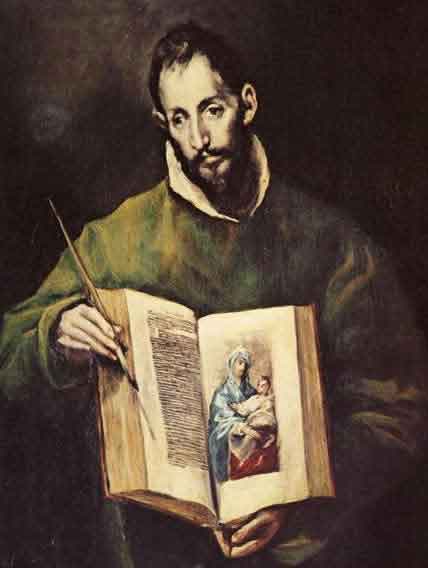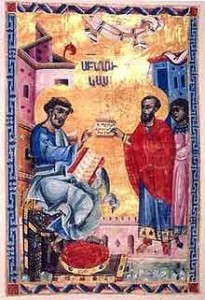What does Jesus’ prayer (Luke 10:21-22) tell us about God and about ourselves? First, it tells us that God is both Father and Lord of earth as well as heaven. He is both Creator and Author of all that he has made, the first origin of everything and transcendent authority, and at the same time, goodness and loving care for all his children. All fatherhood and motherhood are derived from him (Ephesians 3:14-15). Jesus’ prayer also contains a warning that pride can keep us from the love and knowledge of God. Pride closes the mind to God’s truth and wisdom for our lives. Jesus contrasts pride with child-like simplicity and humility. The simple of heart are like “babes” in the sense that they see purely without pretense and acknowledge their dependence and trust in God who is the source of all wisdom and strength. They seek one thing – the “summum bonum” or “greatest good” which is God himself. Simplicity of heart is wedded with humility, the queen of virtues, because humility inclines the heart towards grace and truth. Just as pride is the root of every sin and evil we can conceive, so humility is the only soil in which the grace of God can take root. It alone takes the right attitude before God and allows him as God to do all. “God opposes the proud, but gives grace to the humble” (Prov. 3:34, James 4:6). The grace of Christ-like humility inclines us towards God and disposes us to receive God’s wisdom, grace, and help. Nothing can give us greater joy than the knowledge that we are God’s beloved and that our names are written in heaven (Luke 10:20). Do you seek God’s wisdom and grace with humility and trust?
Jesus makes a claim which no one would have dared to make: He is the perfect revelation of God. Our knowledge of God is not simply limited to knowing something about God – who he is and what he is like. We can know God personally and be united with him in a relationship of love, trust, and friendship. Jesus makes it possible for each of us to personally know God as our Father. To see Jesus is to see what God is like. In Jesus we see the perfect love of God – a God who cares intensely and who yearns over men and women, loving them to the point of laying down his life for them upon the cross. Do you pray to your Father in heaven with joy and confidence in his love and care for you?
“Lord Jesus, give me the child-like simplicity and purity of faith to gaze upon your face with joy and confidence in your all-merciful love. Remove every doubt, fear, and proud thought which would hinder me from receiving your word with trust and humble submission.”
for the full reflection visit : Daily Reading and Meditation
Tags: catholic, catholic podcast, catholic prayer, cathollc spirituality, don schwager, gospel of luke
This entry was posted on Tuesday, November 29th, 2011 at 12:09 am
You can follow any responses to this entry through the RSS 2.0 feed.
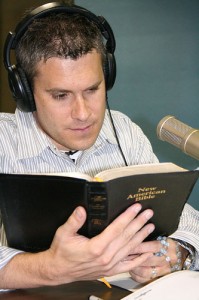 Mark Hart “The Bible Geek” talks to us about the importance of St. Luke
Mark Hart “The Bible Geek” talks to us about the importance of St. Luke
[powerpress]
Luke was a Greco-Syrian physician who lived in the Greek city of Antioch in Ancient Syria.
His earliest notice is in Paul’s Epistle to Philemon, verse 24. He is also mentioned in Colossians 4:14 and 2 Timothy 4:11, two works commonly ascribed to Paul. The next earliest account of Luke is in the Anti-Marcionite Prologue to the Gospel of Luke, a document once thought to date to the 2nd century, but which has more recently been dated to the later 4th century.
If one accepts that Luke was in fact the author of the Gospel bearing his name and also the Acts of the Apostles, certain details of his personal life can be reasonably assumed. While he does exclude himself from those who were eyewitnesses to Jesus’ ministry, he repeatedly uses the word “we” in describing the Pauline missions in Acts of the Apostles, indicating that he was personally there at those times.[9]Epiphanius states that Luke was one of the Seventy (Panarion 51.11), and John Chrysostom indicates at one point that the “brother” Paul mentions in 2 Corinthians 8:18 is either Luke or Barnabas. J. Wenham asserts that Luke was “one of the Seventy, the Emmaus disciple, Lucius of Cyrene and Paul’s kinsman.” Not all scholars are as confident of all of these attributes as Wenham is, not least because Luke’s own statement at the beginning of the Gospel of Luke (1:1–4) freely admits that he was not an eyewitness to the events of the Gospel.
There is similar evidence that Luke resided in Troas, the province which included the ruins of ancient Troy, in that he writes in Acts in the third person about Paul and his travels until they get to Troas, where he switches to the first person plural. The “we” section of Acts continues until the group leaves Philippi, when his writing goes back to the third person. This change happens again when the group returns to Philippi. There are three “we sections” in Acts, all following this rule. Luke never stated, however, that he lived in Troas, and this is the only evidence that he did.
The composition of the writings, as well as the range of vocabulary used, indicate that the author was an educated man. The quote in the Letter of Paul to the Colossians differentiating between Luke and other colleagues “of the circumcision”[10] has caused many to speculate that this indicates Luke was a Gentile. If this were true, it would make Luke the only writer of the New Testament who can clearly be identified as not being Jewish. However, that is not the only possibility. The phrase could just as easily be used to differentiate between those Christians who strictly observed the rituals of Judaism and those who did not.[9]
Luke died at age 84 in Boeotia, according to a “fairly early and widespread tradition”.[11] According to Nikiphoros-Kallistos Xanthopoulos (Eccles. History XIVth c. AD., Migne P.G. 145, 876) and others, Luke’s Tomb was located in Thebes (Greece), from whence his relics were transferred to Constantinople in the year 357.
Luke as a historian
Most scholars understand Luke’s works (Luke-Acts) in the tradition of Greek historiography. The preface of The Gospel of Luke (1:1-4) drawing on historical investigation is believed to have identified the work to the readers as belonging to the genre of history. There is some disagreement about how best to treat Luke’s writings, with some historians regarding Luke as highly accurate, and others taking a more critical approach.Archaeologist Sir William Ramsay wrote that “Luke is a historian of the first rank; not merely are his statements of fact trustworthy…[he] should be placed along with the very greatest of historians.” Professor of classics at Auckland University, E.M. Blaiklock, wrote: “For accuracy of detail, and for evocation of atmosphere, Luke stands, in fact, with Thucydides. The Acts of the Apostles is not shoddy product of pious imagining, but a trustworthy record…it was the spadework of archaeology which first revealed the truth.”  New Testament scholar Colin Hemer has made a number of advancements in understanding the historical nature and accuracy of Luke’s writings.Â
Luke as an artist
Another Christian tradition states that he was the first icon painter. He is said to have painted pictures of the Virgin Mary (for example, The Black Madonna of CzÄ™stochowa or Our Lady of Vladimir) and of Peter and Paul. Thus late medieval Guilds of St Luke in the cities of Flanders, or the “Accademia di San Luca” (Academy of St. Luke) in Rome–imitated in many other European cities during the 16th century–gathered together and protected painters. The tradition that Luke painted icons of Mary and Jesus has been common, particularly in Eastern Orthodoxy. The tradition also has support from the Saint Thomas Christiansof India who claim to still have one of the Theotokos icons that St. Luke painted and which St. Thomas brought to India.ÂNew Testament books
- See also Gospel of Luke  and Acts of the Apostles
Some scholars attribute to Luke the third Gospel and the Acts of the Apostles, which is clearly meant to be read as a sequel to the Gospel account. Other scholars question Luke’s authorship of these books. Many secular scholars give credit to Luke’s abilities as a historian. Both books are dedicated to oneTheophilus and no scholar seriously doubts that the same person wrote both works, though neither work contains the name of its author.
Many argue that the author of the book must have been a companion of the Apostle Paul, because of several passages in Acts written in the first person plural (known as the We Sections). These verses seem to indicate the author was traveling with Paul during parts of his journeys. Some scholars report that, of the colleagues that Paul mentions in his epistles, the process of elimination leaves Luke as the only person who fits everything known about the author of Luke/Acts.
Additionally, the earliest manuscript of the Gospel, dated circa AD 200, ascribes the work to Luke; as did Irenaeus, writing circa AD 180; and the Muratorian fragment from AD 170. Scholars defending Luke’s authorship say there is no reason for early Christians to attribute these works to such a minor figure if he did not in fact write them, nor is there any tradition attributing this work to any other author.
The ox as symbol of St. LukeIn traditional depictions, such as paintings, evangelist portraits and church mosaics, St. Luke is often accompanied by an ox or bull, usually having wings. Also, only the symbol may be shown, especially when in a combination of those of all Four Evangelists.
Tags: catholic, catholic podcast, catholic prayer, cathollc spirituality, gospel of luke, life teen
This entry was posted on Tuesday, October 18th, 2011 at 10:19 am
You can follow any responses to this entry through the RSS 2.0 feed.
“Those who hear the word of God and do it”
[powerpress=”daily-scripture”]
an excerpt from today’s reflection by Don Schwager:
Jesus is God’s love incarnate – God’s love made visible in human flesh (1 John 4:9-10). That is why Jesus describes himself as the good shepherd who lays down his life for his sheep and the shepherd who seeks out the sheep who have strayed and lost their way. God is like the father who yearns for his prodigal son to return home and then throws a great party for his son when he has a change of heart and comes back (Luke 15:11-32). Jesus offered up his life on the cross for our sake, so that we could be forgiven and restored to unity and friendship with God. It is through Jesus that we become the adopted children of God – his own sons and daughters. That is why Jesus told his disciples that they would have many new friends and family relationships in his kingdom. Whoever does the will of God is a friend of God and a member of his family – his sons and daughters who have been ransomed by the precious blood of Christ.
An early Christian martyr once said that “a Christian’s only relatives are the saints” – namely those who have been redeemed by the blood of Christ and adopted as sons and daughters of God. Those who have been baptized into Jesus Christ and who live as his disciples enter into a new family, a family of “saints” here on earth and in heaven. Jesus changes the order of relationships and shows that true kinship is not just a matter of flesh and blood. Our adoption as sons and daughters of God transforms all of our relationships and requires a new order of loyalty to God first and to his kingdom of righteousness and peace. Do you want to grow in love and friendship? Allow God’s Holy Spirit to transform your heart, mind, and will to enable you to love freely and generously as he loves.
“Heavenly Father, you are the source of all true friendship and love. In all my relationships, may your love be my constant guide for choosing what is good and for rejecting what is contrary to your will.”
for the full reflection visit : Daily Reading and Meditation
Tags: catholic, catholic podcast, catholic prayer, cathollc spirituality, don schwager, gospel of luke
This entry was posted on Tuesday, September 20th, 2011 at 9:03 am
You can follow any responses to this entry through the RSS 2.0 feed.
“When the Lord saw her, he had compassion on her”
[powerpress=”daily-scripture”]
an excerpt from today’s reflection by Don Schwager:
The scriptures make clear that God takes no pleasure in the death of anyone (see Ezekiel 33:11); he desires life, not death. Jesus not only had heart-felt compassion for the widow who lost her only son, he also had extraordinary supernatural power – the ability to restore life and to make whole again. Jesus, however, as an observant Jew incurred grave risk by approaching the bier, since the Jews understood that contact with a dead body made oneself ritually impure. His physical touch, however, not only restored life but brought freedom and wholeness to soul as well as body. This miracle took place near the spot where the prophet Elisha raised another mother’s son back to life again (see 2 Kings 4:18-37). Jesus claimed as his own one whom death had seized as its prey. By his word of power he restored life for a lad marked for death. Jesus is Lord not only of the living but of the dead as well. Jesus triumphed over the grave and he promises that because he lives (and will never die again), we also shall have abundant life with and in him both now and forever (John 14:19). Do you trust in the Lord Jesus to give you abundant life and everlasting hope in the face of life’s trials, misfortunes, and moments of despair?
“Lord Jesus, your presence brings life and restores us to wholeness of mind, body, and spirit. Speak your word to me and give me renewed hope, strength and courage to follow you in all things and to eagerly serve others with a glad and generous heart.”
for the full reflection visit : Daily Reading and Meditation
Tags: catholic, catholic podcast, catholic prayer, cathollc spirituality, don schwager, gospel of luke
This entry was posted on Tuesday, September 13th, 2011 at 8:23 am
You can follow any responses to this entry through the RSS 2.0 feed.
“But say the word, and let my servant be healed”
[powerpress=”daily-scripture”]
an excerpt from today’s reflection by Don Schwager:
The centurion who approached Jesus was not only courageous, but faith-filled as well. He risked the ridicule of his Roman companions by seeking help from a Jewish preacher from Galilee, as well as mockery from the Jews who despised Roman occupation of their land. Nonetheless, this centurion approached Jesus with confidence and humility. Augustine notes that the centurion regarded himself as unworthy to receive the Lord into his house: “Humility was the door through which the Lord entered to take full possession of one whom he already possessed.” The centurion was an extraordinary man because he loved his slave. In the Roman world slaves were treated like animals rather than people. The centurion was also an extraordinary man of faith. He believed that Jesus had the power to heal his beloved slave. Jesus commends him for his faith and immediately grants him his request. Are you willing to suffer ridicule in the practice of your faith? And when you need help, do you approach the Lord Jesus with expectant faith?
“Heavenly Father, you sent us your Son Jesus Christ that we might be freed from the tyranny of sin and death. Increase my faith in the power of your saving word and give me freedom to love and serve others with generosity and mercy as you have loved me.”
for the full reflection visit : Daily Reading and Meditation
Tags: catholic, catholic podcast, catholic prayer, cathollc spirituality, don schwager, gospel of luke
This entry was posted on Monday, September 12th, 2011 at 6:03 am
You can follow any responses to this entry through the RSS 2.0 feed.
“Do you not see the log that is in your own eye?”
[powerpress=”daily-scripture”]
an excerpt from today’s reflection by Don Schwager:
If Christ has truly freed us from guilt and condemnation, then why is judgmentalism and a critical spirit so rampant today, even among Christians? “Thinking the best of other people” is necessary if we wish to grow in love. And kindliness in judgment is nothing less that a sacred duty. The Rabbis warned people: “He who judges his neighbor favorably will be judged favorably by God.” How easy it is to misjudge and how difficult it is to be impartial in judgment. Our judgment of others is usually “off the mark” because we can’t see inside the other person, or we don’t have access to all the facts, or we are swayed by instinct and unreasoning reactions to people. It is easier to find fault in others than in oneself. Jesus states a heavenly principle we can stake our lives on: what you give to others (and how you treat others) will return to you (Mark 4:24). The Lord knows our faults and he sees all, even the imperfections and sins of the heart which we cannot recognize in ourselves. Like a gentle father and a skillful doctor he patiently draws us to his seat of mercy and removes the cancer of sin which inhabits our hearts. Do you trust in God’s mercy and grace? Ask the Lord to flood your heart with his loving-kindness and mercy that you may only have room for charity, forbearance, and kindness towards your neighbor.
“O Father, give us the humility which realizes its ignorance, admits its mistakes, recognizes its need, welcomes advice, accepts rebuke. Help us always to praise rather than to criticize, to sympathize rather than to discourage, to build rather than to destroy, and to think of people at their best rather than at their worst. This we ask for thy name’s sake.” (Prayer of William Barclay, 20th century)
for the full reflection visit : Daily Reading and Meditation
Tags: catholic, catholic podcast, catholic prayer, cathollc spirituality, don schwager, gospel of luke
This entry was posted on Friday, September 9th, 2011 at 11:47 am
You can follow any responses to this entry through the RSS 2.0 feed.
“Blessed are you that weep now, for you shall laugh”
[powerpress=”daily-scripture”]
an excerpt from today’s reflection by Don Schwager:
When you encounter misfortune, grief, or tragic loss, how do you respond? With fear or faith? With passive resignation or with patient hope and trust in God? We know from experience that no one can escape all of the inevitable trials of life – pain, suffering, sickness, and death. When Jesus began to teach his disciples he gave them a “way of happiness” that transcends every difficulty and trouble that can weigh us down with grief and despair. Jesus began his sermon on the mount by addressing the issue of where true happiness can be found. The word beatitude literally means happiness or blessedness. Jesus’ way of happiness, however, demands a transformation from within – a conversion of heart and mind which can only come about through the gift and working of the Holy Spirit.
How can one possibly find happiness in poverty, hunger, mourning, and persecution? If we want to be filled with the joy and happiness of heaven, then we must empty ourselves of all that would shut God out of our hearts. Poverty of spirit finds ample room and joy in possessing God alone as the greatest treasure possible. Hunger of the spirit seeks nourishment and strength in God’s word and Spirit. Sorrow and mourning over wasted life and sin leads to joyful freedom from the burden of guilt and oppression. God reveals to the humble of heart the true source of abundant life and happiness. Jesus promises his disciples that the joys of heaven will more than compensate for the troubles and hardships they can expect in this world. Thomas Aquinas said: “No person can live without joy. That is why someone deprived of spiritual joy goes after carnal pleasures.” Do you know the joy and happiness of hungering and thirsting for God alone?
“Lord Jesus, increase my hunger for you and show me the way that leads to everlasting happiness and peace. May I desire you above all else and find perfect joy in doing your will.”
for the full reflection visit : Daily Reading and Meditation
Tags: beatitudes, catholic, catholic podcast, catholic prayer, cathollc spirituality, don schwager, gospel of luke
This entry was posted on Wednesday, September 7th, 2011 at 12:50 am
You can follow any responses to this entry through the RSS 2.0 feed.
“Can you make wedding guests fast while the bridegroom is with them?”
[powerpress=”daily-scripture”]
an excerpt from today’s reflection by Don Schwager:
Jesus used an image familiar to his audience – new and old wineskins. In Jesus’ times, wine was stored in wineskins, not bottles. New wine poured into skins was still fermenting. The gases exerted gave pressure. New wine skins were elastic enough to take the pressure, but old wine skins easily burst because they were hard. What did Jesus mean by this comparison? Are we to reject the old in place of the new? Just as there is a right place and a right time for fasting and for feasting, so there is a right place for the old as well as the new. Jesus says the kingdom of heaven is like a householder who brings out of his treasure what is new and what is old (Matthew 13:52). How impoverished we would be if we only had the Old Testament or the New Testament, rather than both. The Lord gives us wisdom so we can make the best use of both the old and the new. He doesn’t want us to hold rigidly to the past and to be resistant to the new work of his Holy Spirit in our lives. He wants our minds and hearts to be like the new wine skins – open and ready to receive the new wine of the Holy Spirit. Are you eager to grow in the knowledge and understanding of God’s word and plan for your life?
“Lord Jesus, fill me with your Holy Spirit, that I may grow in the knowledge of your great love and truth. Help me to seek you earnestly in prayer and fasting that I may turn away from sin and wilfulness and conform my life more fully to your will. May I always find joy in knowing, loving, and serving you.”
for the full reflection visit : Daily Reading and Meditation
Tags: catholic, catholic podcast, catholic prayer, cathollc spirituality, don schwager, gospel of luke
This entry was posted on Friday, September 2nd, 2011 at 12:02 am
You can follow any responses to this entry through the RSS 2.0 feed.
“Do not be afraid; henceforth you will be catching men”
[powerpress=”daily-scripture”]
an excerpt from today’s reflection by Don Schwager:
This incident tells us an important truth about how God works in and through each of us for his glory. God expects of us greater things than we can do by ourselves. When we cooperate in his works, we accomplish far beyond what we can do on our own. Therese of Lisieux, A Carmelite nun who died of tuberculosis at the age of twenty-four, wrote to a friend: “..Jesus has so incomprehensible a love for us that he wills that we have a share with him in the salvation of souls. He wills to do nothing without us. The Creator of the universe awaits the prayer of a poor little soul to save other souls redeemed like it at the price of all his Blood.” When God’s word is spoken his kingdom is revealed and his power is released. When people respond to God’s word with faith and obedience they are changed and made “a new creation” in Christ (2 Corinthians 5:17).
God chooses ordinary people, like you and me, as his ambassadors and he uses the ordinary circumstances of our daily lives and work situations to draw others into his kingdom. Jesus speaks the same message to us today: we will “catch people” for the kingdom of God if we allow the light of Jesus Christ to shine through us. God wants others to see the light of Christ in us in the way we live, speak, and witness the joy of the gospel. Paul the Apostles says, But thanks be to God, who in Christ Jesus always leads us in triumph, and through us spreads the fragrance of the knowledge of him everywhere. For we are the aroma of Christ to God among those who are being saved and among those who are perishing (2 Cor. 2:15). Do you witness to those around you the joy of the gospel and do you pray for your neighbors, co-workers, and relatives that they may come to know the Lord Jesus Christ and grow in the knowledge of his love?
“Lord Jesus, fill my heart with love and compassion for those who do not know you or follow you. May I be a good witness of your truth and salvation to my family, friends, and co-workers.”
for the full reflection visit : Daily Reading and Meditation
Tags: catholic, catholic podcast, catholic prayer, cathollc spirituality, don schwager, gospel of luke
This entry was posted on Thursday, September 1st, 2011 at 12:03 am
You can follow any responses to this entry through the RSS 2.0 feed.
“He laid his hands on every one and healed them”
[powerpress=”daily-scripture”]
an excerpt from today’s reflection by Don Schwager:
When Jesus and the disciples sought a lonely place to regroup and rest, they found instead a crowd waiting for them! Did they resent this intrusion on their hard-earned need for privacy and refreshment? Jesus certainly didn’t but welcomed them with open-arms. Jesus put human need ahead of everything else. His compassion showed the depths of God’s love and concern for all who are truly needy. Jesus gave the people the word of God and he healed them physically as well as spiritually. We can never intrude upon God nor exhaust his generosity and kindness. He is ever ready to give to those who earnestly seek him out. Do you allow Jesus to be the Lord and Healer in your personal life, family, and community? Approach him with expectant faith. God’s healing power restores us not only to health but to active service and care of others. There is no trouble he does not want to help us with and there is no bondage he can’t set us free from. Do you take your troubles to him with expectant faith that he will help you?
“Lord Jesus Christ, you have all power to heal and to deliver. There is no trouble nor bondage you cannot overcome. Set me free to serve you joyfully and to love and serve others generously. May nothing hinder me from giving myself wholly to you and to your service.”
for the full reflection visit : Daily Reading and Meditation
Tags: catholic, catholic podcast, catholic prayer, cathollc spirituality, don schwager, gospel of luke
This entry was posted on Wednesday, August 31st, 2011 at 8:01 am
You can follow any responses to this entry through the RSS 2.0 feed.
“His word was with authority”
[powerpress=”daily-scripture”]
an excerpt from today’s reflection by Don Schwager:
When you read or hear the word of God how do you respond to it? Do you hear it with indifference, selective submission, or with the full assent of faith and obedience? When Jesus taught he spoke with authority. He spoke the word of God as no one had spoken it before. When the Rabbis taught they supported their statements with quotes from other authorities. The prophets spoke with delegated authority – Thus says the Lord. When Jesus spoke he needed no authorities to back his statements. He was authority incarnate – the Word of God made flesh. When he spoke, God spoke. When he commanded even the demons obeyed. If demons, the fallen angels, believe in the power and authority of the Son of God, how much more should we believe in the power and authority of the gospel – the good news of Jesus Christ – with the full assent of our minds and hearts and entrust our lives to the Lord Jesus Christ? If we approach God’s word submissively, with an eagerness to do everything the Lord desires, we are in a much better position to learn what God wants to teach us through his word. Are you eager to be taught by the Lord and to conform your life according to his word?
 “Lord Jesus, your word is power and life. May I never doubt your saving love and mercy, and the power of your word to bring healing, restoration, and freedom from sin and oppression.”
for the full reflection visit : Daily Reading and Meditation
Tags: catholic, catholic podcast, catholic prayer, cathollc spirituality, don schwager, gospel of luke
This entry was posted on Tuesday, August 30th, 2011 at 5:34 am
You can follow any responses to this entry through the RSS 2.0 feed.
“While Jesus blessed them, he parted from them, and was carried up into heaven”
[powerpress feed=”daily-scripture”]
an excerpt from today’s reflection by Don Schwager:
Why did Jesus leave his disciples forty days after his resurrection? Forty is a significant number in the scriptures. Moses went to the mountain to seek the face of God for forty days in prayer and fasting. The people of Israel were in the wilderness for forty years in preparation for their entry into the promised land. Elijah fasted for forty days as he journeyed in the wilderness to the mountain of God. For forty days after his resurrection Jesus appeared numerous times to his disciples to assure them that he had risen indeed and to prepare them for the task of carrying on the work which he began during his earthy ministry.
Jesus’ departure and ascension was both an end and a beginning for his disciples. While it was the end of Jesus’ physical presence with his beloved disciples, it marked the beginning of Jesus’ presence with them in a new way. Jesus promised that he would be with them always to the end of time (Matthew 28:20). Now as the glorified and risen Lord and Savior, ascended to the right hand of the Father in heaven, Jesus 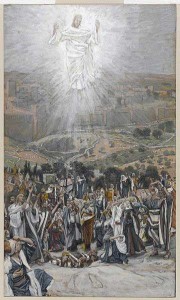 promised to send them the Holy Spirit who would anoint them with power on the Feast of Pentecost, just as Jesus was anointed for his ministry at the River Jordan. When the Lord Jesus departed physically from the apostles, they were not left in sorrow or grief. Instead, they were filled with joy and with great anticipation for the coming of the Holy Spirit.
promised to send them the Holy Spirit who would anoint them with power on the Feast of Pentecost, just as Jesus was anointed for his ministry at the River Jordan. When the Lord Jesus departed physically from the apostles, they were not left in sorrow or grief. Instead, they were filled with joy and with great anticipation for the coming of the Holy Spirit.
Jesus’ last words to his apostles point to his saving mission and to their mission to be witnesses of his saving death and his glorious resurrection and to proclaim the good news of salvation to all the world. Their task is to proclaim the gospel – the good news of salvation – not only to the people of Israel, but to all the nations as well. God’s love and gift of salvation is not reserved for a few or for one nation alone, but it is for the whole world – for all who will accept it. The gospel is the power of God, the power to release people from their burden of guilt, sin, and oppression, and the power to heal, restore, and make us whole. Do you believe in the power of the gospel?
This is the great commission which the risen Christ gives to the whole church. All believers have been given a share in this task – to be heralds of the good news and ambassadors for Jesus Christ, the only savior of the world. We have not been left alone in this task, for the risen Lord works in and through us by the power of his Holy Spirit. Today we witness a new Pentecost as the Lord pours out his Holy Spirit upon his people to renew and strengthen the body of Christ and to equip it for effective ministry and mission world-wide. Do you witness to others the joy of the gospel and the hope of the resurrection?
“Lord Jesus, through the gift of your Holy Spirit, you fill us with an indomitable spirit of praise and joy which no earthly trial can subdue. Fill me with your resurrection joy and help me to live a life of praise and thanksgiving for your glory. May I witness to those around me the joy of the gospel and the reality of your resurrection.â€
for the full reflection visit : Daily Reading and Meditation
Tags: catholic, catholic podcast, catholic prayer, cathollc spirituality, don schwager, gospel of luke
This entry was posted on Thursday, June 2nd, 2011 at 12:17 am
You can follow any responses to this entry through the RSS 2.0 feed.
“Why is this granted me, that the mother of my Lord should come to me?”
[powerpress feed=”daily-scripture”]
an excerpt from today’s reflection by Don Schwager:
Do you recognize the indwelling presence of the Lord Jesus in your life? Blessed are you if you see and recognize the Lord with the “eyes of faith”. The word “blessed” [makarios in Greek] literally means “happiness” or “beatitude”. It describes a kind of joy which is serene and untouchable, self-contained, and independent from chance and changing circumstances of life. There is a certain paradox for those “blessed” by the Lord. Mary was given the “blessedness” of being the mother of the Son of God. That blessedness also would become a sword which pierced her heart as her Son died upon the cross. Anselm, a great teacher and Archbishop of Canterberry (1033-1109), spoke these words in a homily: “Without God’s Son nothing could exist; without Mary’s son, nothing could be redeemed.” To be chosen by God is an awesome privilege and responsibility. Mary received both a crown of joy and a cross of sorrow. Her joy was not diminished by her sorrow because it 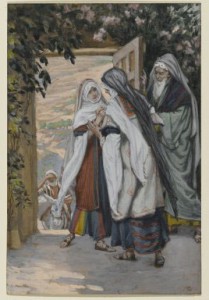 was fueled by her faith, hope, and trust in God and his promises. Jesus promised his disciples that “no one will take your joy from you” (John 16:22). The Lord gives us a supernatural joy which enables us to bear any sorrow or pain and which neither life nor death can take away. Do you know the joy of a life given over to God in faith and trust?
was fueled by her faith, hope, and trust in God and his promises. Jesus promised his disciples that “no one will take your joy from you” (John 16:22). The Lord gives us a supernatural joy which enables us to bear any sorrow or pain and which neither life nor death can take away. Do you know the joy of a life given over to God in faith and trust?
What is the significance of Mary’s visit to her cousin Elizabeth before the birth of Jesus? When Elizabeth greeted Mary and recognized the Messiah in Mary’s womb they were filled with the Holy Spirit and with a joyful anticipation of the fulfilment of God’s promise to give a Savior. What a marvelous wonder for God to fill not only Elizabeth’s heart with his Holy Spirit but the child in her womb as well. John the Baptist, even before the birth of the Messiah, pointed to his coming and leapt for joy in the womb of his mother as the Holy Spirit revealed to him the presence of the King to be born. The Holy Spirit is God’s gift to us to enable us to know and experience the indwelling presence of God and the power of his kingdom. The Holy Spirit is the way in which God reigns within each of us. Do you live in the joy and knowledge of God’s indwelling presence with you through his Holy Spirit?
“Lord Jesus, fill me with your Holy Spirit and give me joy in seeking you more closely. Increase my faith in all your promises, my hope in the joys of heaven, and my love for You as my All.”
for the full reflection visit : Daily Reading and Meditation
Tags: catholic, catholic podcast, catholic prayer, cathollc spirituality, don schwager, faith, gospel of luke, holy spirit, joy, mother
This entry was posted on Tuesday, May 31st, 2011 at 12:29 am
You can follow any responses to this entry through the RSS 2.0 feed.
“Jesus opened their minds to understand the scriptures”“
[powerpress feed=”daily-scripture”]
an excerpt from today’s reflection by Don Schwager: 
Aren’t we like the apostles? We wont believe unless we can see with our own eyes. The gospels attest to the reality of the resurrection. Jesus goes to great lengths to assure his disciples that he is no mere ghost or illusion. He shows them the marks of his crucifixion and he explains how the scriptures foretold his death and rising. Jerome, an early church bible scholar, comments: “As he showed them real hands and a real side, he really ate with his disciples; really walked with Cleophas; conversed with men with a real tongue; really reclined at supper; with real hands took bread, blessed and broke it, and was offering it to them. ..Do not put the power of the Lord on the level with the tricks of magicians, so that he may appear to have been what he was not, and may be thought to have eaten without teeth, walked without feet, broken bread without hands, spoken without a tongue, and showed a side which had no ribs.” (From a letter to Pammachius against John of Jerusalem 34, 5th century)
The centrality of the gospel is the cross; but fortunately it does not stop there. Through the cross Jesus defeated our enemies – death and Satan and won pardon for our sins. His cross is the door to heaven and the key to paradise. The way to glory is through the cross. When the disciples saw the risen Lord they disbelieved for joy! How can death lead to life, the cross to victory? Jesus shows us the way and he gives us the power to overcome sin and despair, and everything else that would stand in the way of his love and truth. Just as the first disciples were commissioned to bring the good news of salvation to all the nations, so, we, too, are called to be witnesses of the resurrection of Jesus Christ to all who live on the face of the earth. Do you witness the joy of the gospel to those around you?
“Lord Jesus, open our minds to understand the scriptures that we may fully comprehend the truth of your word. Anoint us with your power and give us boldness to proclaim the gospel in word and deed.”
for the full reflection visit : Daily Reading and Meditation
Tags: catholic, catholic podcast, catholic prayer, cathollc spirituality, don schwager, gospel of luke
This entry was posted on Thursday, April 28th, 2011 at 12:05 am
You can follow any responses to this entry through the RSS 2.0 feed.
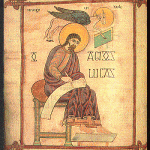 The Gospel of Luke..it’s time, context, importance and relevance for today. Who was Luke? Who were the people he was addressing? What makes it unique?
The Gospel of Luke..it’s time, context, importance and relevance for today. Who was Luke? Who were the people he was addressing? What makes it unique?
[powerpress]
Mark Hart is an author, speaker, director and teacher, Mark’s work both written and spoken, is known across the country and world. While he serves as the Vice President of LIFE TEEN, he is known to tens of thousands simply as the “Bible Geek ®†Mark passionately echoes the gospel to all he encounters. He is as deep as he is funny, and his love for his wife and daughters is second only to his immense love for Jesus Christ.
Visit Mark at www.lifeteen.com
Tags: catholic, catholic podcast, catholic prayer, cathollc spirituality, gospel of luke, life teen, mark hart
This entry was posted on Saturday, February 26th, 2011 at 7:08 am
You can follow any responses to this entry through the RSS 2.0 feed.


